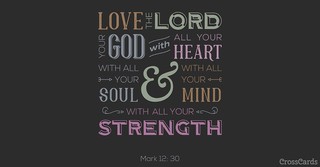
- Recent Translations
- All Translations
Markos 12:33
Share
Settings
Markos 12:33 Meaning and Commentary
And to love him with all the heart
That is, the one God, with a sincere hearty love and affection;
and with all the understanding;
of his being, perfections, and works, which will serve to draw the affections to him: this clause answers to that, "with all thy mind", in ( Mark 12:30 ) ;
and with all the soul;
with all the powers and faculties of it;
and with all the strength;
a man has, or is given him; with all the vehemency and fervency of soul he is master of:
and to love his neighbour as himself;
which are the two great commandments of the law:
is more than all whole burnt offerings and sacrifices;
that is, more excellent in their nature, more acceptable to God, and more useful among men, than all the rituals of the ceremonial law, than any sacrifice whatever: for the two words here used, "burnt offerings and sacrifices", include all offerings; as those which were wholly consumed upon the altar, and those of which part was given to the priests; and all sin offerings, meat offerings, and peace offerings, and whatever else. This man had now at least a different sense of things, from the rest of his brethren; who placed religion chiefly in the observance of the rituals of the law, and the traditions of the elders; and neglected the duties of the moral law, respecting God and their neighbour: things which are to be preferred and attended to, before any ceremonial institutions, and especially the inventions of men. This entirely agrees with the sense of the passage in ( Hosea 6:6 ) . "For I desired mercy and, not sacrifice"; that is, willed and required, that men should show mercy to one another; or that every one should love his neighbour as himself, and attend to this, rather than to the offering of any ceremonial sacrifice: this being more delightful and well-pleasing to God, than that: "and the knowledge of God"; of his unity, perfections, and glory: "more than burnt offerings"; which were entirely devoted to him: and it also agrees with the ancient sentiments of the people of God; so Samuel says to Saul, "Hath the Lord [as great] delight in burnt offerings and sacrifices, as in obeying the voice of the Lord? behold, to obey [is] better than sacrifices, [and] to hearken, than the fat of rams", ( 1 Samuel 15:22 ) . And yet it may be observed, that there is some likeness between these things, burnt offerings and sacrifices, and the love of God and love to our neighbour; though the latter are greatly preferable to the former; true love to God being no other than the offering up of the soul, as a whole burnt offering to God, in the flames of love to him; and love to the neighbour, or doing good and communicating to him, is a sacrifice well-pleasing to God.
